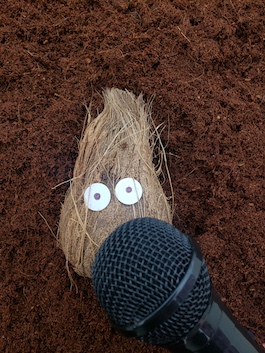Compost facts

INTERVIEW WITH A COCONUT
What lies beneath the shell of our compost's key ingredient?...
What's your full name?
Coco nucifera
Where does it come from?
My three eyes reminded Spanish explorers of the grinning face of a goblin or a 'coco'. It's hardly flattering.
How do you describe yourself?
I'm a drupe which means a fruit and a nut and a seed all in one.
Where do you come from?
We think we began in Indonesia and Malaysia. We bobbed across many oceans and now grow in at least 70 countries.
What's your favourite moment in history?
Probably that coconut theft triggered the Mutiny on the Bounty.
How do you feel about your coir being used in UK gardens?
It's fantastic that what was a waste product is now helping gardeners. We grow so fast that we're easily replaced. This makes us very sustainable, unlike peat.
Just how bad is peat compost?
Trying to persuade fellow growers to go peat-free?Gardeners buy 60%of the peat sold in the UK. So all those bags make difference.
Here are some facts to help convince them:
Destroys unique habitats
Peat was created more than 12,000 years ago from decaying remains of plants. When raised bogs are mined or their peat - they can't grow back. These bogs are home to plant and wildlife species which can only exist in this unique environment.
Encourages flooding
Peat bogs in upland areas soak up water. This helps reduce flooding and flood surges. A pilot study in Ceredigion by the Wildlife Trusts in Wales suggested up o 25% more water could be retained by properly-managed bogs.
Not Necessarily the best for plants
Many gardeners trust peat. But it's not always ideal. It is poor mulch, quickly dries out, and is easily blown away.
Peat compost alternatives have been refined over many years to provide a fantastic growing medium. Our peat -free compost re-wet easily, have good water retention, do not blow away in the wind and are pleasant to handle. No dirty peat-stained fingers ever again!

